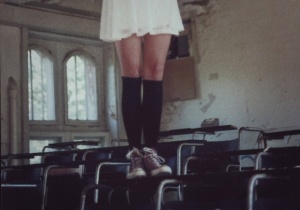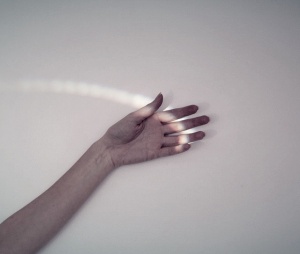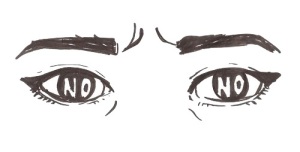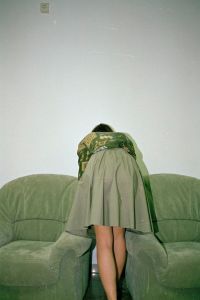I was recently asked to document the events which led to me suffering from Complex PTSD and Anorexia. Even though trauma can never be summed up easily, I have attempted to write down a brief overview. Perhaps some people suffering with the same problems can feel less alone when they read it.
Early Days
In 2007 I was diagnosed with Bulimia, which later led to Anorexia Nervosa. It was thought that I developed the eating disorder as a result of abuse I experienced as a child at the  hands of my father. This abuse included physical, emotional, and sexual abuse.
hands of my father. This abuse included physical, emotional, and sexual abuse.
I grew up in a mixed household, where my mother was Scandinavian, and my father was from the Middle East. They had met at University and gotten married just a year after meeting.
I also grew up in a Protestant Christian context. Both my parents had studied theology, they met at a Christian Uni, and my father worked for the church. You could however, on no account, claim that I was raised in a Christian home. The amount of violence, aggression, unkindness, and cruelty I experienced there was worse than any I have experienced in the most ungodly of places. Surprisingly those early days didn’t cause me to think poorly of Christianity, but rather I decided that what I’d grown up with was nothing like true Christianity.
No Rescue in Sight
My father is an intelligent man. Clever, brilliant, respected, industrious. He has several MAs, a PhD, has worked in high administrative positions within the church and other businesses, and is generally admired by those he engages with. He is also a broken man. One of the hardest things with being abused at home was that I couldn’t tell anyone. Not because I  didn’t want to or didn’t dare to. It was because I was a highly perceptive child and I saw that I couldn’t just tell anyone. I could tell that most people either:
didn’t want to or didn’t dare to. It was because I was a highly perceptive child and I saw that I couldn’t just tell anyone. I could tell that most people either:
1. wouldn’t believe me
2. or it wouldn’t matter even if they did, because they would be too cowardly or apathetic to do anything about it
Knowing this was painful and made me feel cut off from any lifeline. I hardly have words for how much this hurt. Knowing that adults didn’t rescue kids in trouble made me grow up very fast. I don’t know how, but despite living with these awful secrets at home, and a responsibility that would surpass even the capabilities of many adult, I was a highly functioning, extroverted child. I was talkative, smiling, intelligent, engaging, and brilliant. It was therefore assumed that I was also a happy, well-taken-care-of child. I often used creativity to help me through the hard days and developed skills in music, art, writing, woodwork, and media.
My mother knew well about the conditions at home, and she herself was subjected to similar abuse. But the majority of my father’s anger was usually aimed at me, especially because I did whatever I could to protect my mother and younger sister. It has never sat well with me to silently allow injustice or abuse to go unchallenged. My protest cost me dearly.
A Mother’s Love
My mother, arguably after years of being broken down, didn’t fight for her children. She threatened divorce a few times when I was around 7 years old, but my father replied that he’d make sure he got full custody of us children. My mother believed him and din’t  threaten it again. She did nothing to protect or help me or my sister. She just cried. And over time became bitter and passive aggressive in her general behaviour, making dealing with her difficult too. After a while she even convinced herself that her marriage was normal, health, loving.
threaten it again. She did nothing to protect or help me or my sister. She just cried. And over time became bitter and passive aggressive in her general behaviour, making dealing with her difficult too. After a while she even convinced herself that her marriage was normal, health, loving.
She channeled her energy into a fierce loyalty towards my father, believing he loved her more than anyone could. There are people who have seen her as nothing but a victim in this whole mess. True, she is a victim, but it is said that a mother would go through fire to protect her children. My mother chose not to, and opted for fear over what was right.
My mother was a coward in most areas of her life. Including her marriage. I realised she also bears a share of the guilt for what happened at home. We have a responsibility for what we allow to happen, or when we stand idly by. And a 7 year old girl did the job she was meant to do.
The Escape
By 18 I was at University. For the first time I was completely independent of my parent’s resources or legal power. I decided to one day secretly come home from Uni, when no-one was in the house, pack up
 whatever I could of my things, and leave for good. I did. I left and never returned.
whatever I could of my things, and leave for good. I did. I left and never returned.
I hadn’t done so before because the legality would have been harder to get around, as well as I still felt a duty to protect my mother and sister. But at 18 I concluded that if I was to stay sane and alive I needed to get out. And I thought that maybe my mother and sister, inspired by my example, would find the courage to do the same. They didn’t.
After breaking away from home, things got better and things got harder. I felt more free than ever before. But my father sought retribution. I had to be careful not to run into him, which was a challenge since we still both lived in the UK, and being apart of the same church increased the chance of our paths crossing.
After a while my little sister stopped talking to me. We have always dealt with conflict in different ways. Despite my hate of it, I have mostly met conflict head on, being willing to fight if it was for a good reason. My sister equally hated conflict, but often buried her head in the sand or chose the door over dealing with what was in front of her. She had mainly been in denial or chosen to ignore the state of things at home – she simply didn’t want to deal with it. She felt that my actions were disruptive, unnecessarily extreme, and upsetting. She begged me not to go to the police, not to ‘create the drama’. Losing her was very painful. She was my best friend. She hasn’t communicated with me till this day.
Sharing the Unsharable
The first people I ever told about what had happened to me were two friends from Uni. Both of them listened and were kind, but I later regretted choosing to trust them. One of them was comparatively apathetic and insensitive in speaking to me  about it. The second went on to work for the church.
about it. The second went on to work for the church.
This second friend told me one day over the phone that he’d seen my father at a church meeting. This was after I’d told my friend about the abuse. My friend told me he’d walked up and said to my father: “I can’t imagine Aria would lie about something like this. But also can’t believe you would do something like this.” When my friend told me what he’d said to my father, I felt like I’d been stabbed. I couldn’t believe he’d said that. The fear of not being believed is one of the greatest fears that keeps abuse victims from talking. And he had just expressed his disbelief to my father.
During the months after leaving home, I started showing severe signs of Complex Post-traumatic Street Disorder. Although it wasn’t the first time. After a while the head deans at my Uni had to be told, due to my sleeplessness, suicidal tendencies, cutting, and my frequent visits to the A&E.
Having informed my deans at Uni, it was policy that they in turn inform their bosses. The authorities were involved. This again opened up this very painful story to more insensitive, judging, ignorant people – people I wouldn’t have trusted my houseplants with. The Catholic church is not alone in dealing poorly (or atrociously) with issues of abuse. Our church is similar in its course of denial, illegal covering up, and further injuring of the victims. Many of the people who were told about my case within the church and my Uni knew my father, and had been at Uni or worked with him. This made me feel like I was the outsider, and the odds were against me.
Talking to the Police
I gave a testimony to the police 4 months after I left home, and an abuse case was opened against my father. I sat giving my testimony to the detective in charge of my case, with 4 cameras pointing at me. Sitting in that small room was one of the hardest things I’ve ever done. I was shaking  the whole time, and I had fierce stomach cramps walking home afterwards. I had never spoken about the abuse out loud in such detail before. And the amount of information they needed made me feel like I needed to throw up.
the whole time, and I had fierce stomach cramps walking home afterwards. I had never spoken about the abuse out loud in such detail before. And the amount of information they needed made me feel like I needed to throw up.
Prior to taking my testimony, the detective showed me the side room, which lay next to the interview room. It was a medical-check room, fully fitted with a tray of sterilised tools, and a gynaecological examination chair.
Following my testimony, my case was set to be taken before the Supreme Court in England. But it didn’t go through. I was informed via letter from the Crown’s High Court that the lawyers in charge of my case had concluded there wasn’t enough evidence for my case to reach a trial level. My detective had warned me of this. Abuse, especially childhood abuse, is very hard to prove and most cases never reach trial level. I felt exhausted after months of police investigation and emotional turmoil.
What Justice?
At this point I could no longer continue with my studies, and I had to take a break from Uni. I moved around a lot. Over a year later I returned to my studies, completed my degree and moved into a house where I began working as an artist. The years following my departure from home were challenging. I had no or little money. I had lost many friends along the way. I often felt  isolated and misunderstood. But it was better than being under my parents’ roof.
isolated and misunderstood. But it was better than being under my parents’ roof.
For years I felt like my story was invalid or I couldn’t share it. People talked to me like if I could only win a court case against my father, I’m receive justice. What ignorance. No-one that has been the victim of abuse feels like justice is served at a bang of a gavel. What justice is there? What could undo what happened or ‘make up’ for the damage cause? What do they even mean with the word ‘justice’? There will never be a balancing of the scales. Not even revenge could balance them. No conviction, no slam of a gavel, no money could ever compensate for what happened.
.
And The Friends In Need
Since the information of the abuse has surfaced, I have been accused of being attention-seeking, a liar, a fraud, insane, a complainer. I have had people tell me it was my fault. I have had people blame me, or tell me Jesus won’t forgive me for my sins until I forgive my father. I have been told by members of my extended family to ‘just go home, or I’ll regret that I didn’t make things right’. I have been told my eternal soul hangs in the  balance until I reconcile with my parents. I have been told it’s my duty to save my mother, to convince her to leave, or to rescue my sister. I’ve been told it’s my duty to stand out as a public figure and openly talk about the abuse in church so that others in similar circumstances will have a voice.
balance until I reconcile with my parents. I have been told it’s my duty to save my mother, to convince her to leave, or to rescue my sister. I’ve been told it’s my duty to stand out as a public figure and openly talk about the abuse in church so that others in similar circumstances will have a voice.
I have been told it’s my job to have my father convicted so there won’t be other potential victims of his abuse. I’ve been told its my duty to shrink away and not make more trouble. I’ve been told ‘these things happen’. I’ve been told ‘most people go through similar stuff. Do you think you’re so unique?’. I’ve been told ‘your parents really love you. But you mustn’t expect them to be perfect’. I’ve been told ‘I just can’t imagine that your father would do anything like this. He’s a good man.’ I’ve been told that it’s imperative that I got to therapy and ‘work through’ everything, like it’s similar to doing your taxes or working through a math problem.
These words have mainly come from ‘friends’, pastors, future ministers, professionals, family, deans, and counsellors.
The Jury is Out
My father’s boss, who was informed of the allegations against my father, wrote me a letter during the year I left home. He wrote that I needed to stop lying. He wrote that I needed to keep quiet and not make any reputation-damaging allegations unless I was willing to ‘back it up’. He wrote that my only option was to come into the office where my father worked (the head quarters of the European section of our church), and tell my story  to a board room full of church leaders (my father’s colleagues), my father’s boss included. They would hear the details of my case. Then my father’s boss, along with the other old, white men, would weigh the evidence and ‘make a judgement’.
to a board room full of church leaders (my father’s colleagues), my father’s boss included. They would hear the details of my case. Then my father’s boss, along with the other old, white men, would weigh the evidence and ‘make a judgement’.
My father’s boss wrote that if I was not willing to agree to these terms, I had no option but to stop my allegations, and that if I didn’t reply to his offer, then he would take it as a sign that I was liar and I would stop speaking. I never replied. Two years later, my father was promoted to the position of my father’s previous boss. My father had been groomed for that position for years.
I cry every day. I cry about the cruelty shown to me by the two people who were meant to love me the most in this life. I cry about the cowardice, the ignorance, the shame I have to live with every day. I scream inside and rave against the injustice. I cry to God “Is there no justice?” I feel completely damaged, tainted, destroyed. I feel as though I walk naked through the world, uncovered and drowning in shame and disgust.
I’ve had nowhere to aim this disgust at except inwardly, at myself. I am told this is likely why I struggle with so much self-hatred, self harming and an eating disorder.
Trauma, PTSD, and Living With It
As things are now, my mother is still loyal to my father, lying for him, lying to herself. They are still married. My sister doesn’t speak to me and lives with her husband. My father still works for the church, and holds the highest administrative position in the European church section of  our church, despite the police investigation against him. Anyone who has voiced their concern due to the allegations against him, from what I know, have either lost their job or been threatened by himself or his previous boss.
our church, despite the police investigation against him. Anyone who has voiced their concern due to the allegations against him, from what I know, have either lost their job or been threatened by himself or his previous boss.
I cannot express how much pain my chest has roomed, how much humiliation that has burned me. I cannot explain to anyone the trauma that haunts me every day, the terror of having flashbacks, the fury that rages inside me. How can I explain to someone that some days death seems better than life to me? How can I explain that dragging a knife across my arm serves as a relief for the anguish inside? How can I explain to someone what it feels like to be unloved by your parents – the two people who are supposed to love you above all others. I am filled with shame, with loneliness, with a seething anger at an unforgivable injustice. I am filled with fury towards all those adults who failed me along the way, all due to corruption or base cowardice.
I cannot explain to anyone how much I have borne or how exhausted I am. I have good days and bad days. Mainly bad days. I struggled with symptoms of complex PTSD, I struggle with cutting, which relieves the pain for a just a moment. I struggle with Depression, with Anorexia. I struggle with self-hatred. I have night terrors and  flashbacks. I feel like if I can’t control anything in life, then I will control my weight at least. Can anyone understand how much pain a human being has to be in if they find relief in pulling a blade across their skin? Or by starving?
flashbacks. I feel like if I can’t control anything in life, then I will control my weight at least. Can anyone understand how much pain a human being has to be in if they find relief in pulling a blade across their skin? Or by starving?
I don’t want to struggle in silence forever, but I also have no faith in the virtue of public opinion or social justice. No court, legal or social, will vindicate me or bring justice. I know that. I may not have the ears of my church, or of the High Court, or of the many people who have abandoned me along the way. All I know how to do is to take very tiny steps into each new day. I am not trying to fix myself, I am not trying to pretend I’m ok, or ever will be. I am just trying to slowly, surely, write my pain into words.
One day at a time.
Aria |